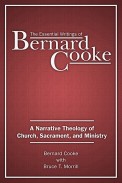 I HAVE JUST finished reading a book that I had been waiting to see printed since last year: “The Essential Writings of Bernard Cooke: A Narrative Theology of Church, Sacrament and Ministry” (New York: Paulist Press, 2016, pp. 239, $27.95). Jesuit Father Bruce T. Morill edited the book and included his own comments on Cooke’s writings.
I HAVE JUST finished reading a book that I had been waiting to see printed since last year: “The Essential Writings of Bernard Cooke: A Narrative Theology of Church, Sacrament and Ministry” (New York: Paulist Press, 2016, pp. 239, $27.95). Jesuit Father Bruce T. Morill edited the book and included his own comments on Cooke’s writings.
To explain why I so eagerly looked forward to reading the book, I have to reveal some of my own history. When I arrived at Marquette University in Milwaukee, Wisc., in 1965 to pursue a doctorate in philosophy, Bernard Cooke was the chairman of the theology department. The theology program was very popular, and Cooke was enormously popular. When I registered for my courses, I discovered I was free to take two courses in some minor.
Having heard Cooke lecture in New York, I wanted to minor in theology. Actually, I wanted to minor in Bernard Cooke. The philosophy chairperson tried to dissuade me from theology courses, but I insisted, which was somewhat out of character. Perhaps the Holy Spirit gave me courage, and thank heaven, because the two courses I took with Cooke were the best two courses I ever had in my life. Eventually, Cooke and I developed a friendship – one that I treasured for almost 50 years, right up to his death on his 91st birthday, May 31, 2013.
Instructed and Challenged
In collecting Cooke’s essential writings into one volume along with sections of his unpublished memoir, Father Morrill has performed a valuable service, especially for people studying theology on the undergraduate and graduate levels. As a teacher, Cooke had the rare gift of being both profound and clear. Thinking back on his lectures, I recall being both instructed and challenged. Working through this volume of his writings was like a delightful walk down memory lane. His lectures were informative, thought-provoking and often inspiring, though never preachy.
There is no way to summarize Cooke’s writings in one column; they cover too much territory in the history of theology and in Cooke’s journey toward his theological synthesis. But I can quote his insights. The following paragraph on love I find both insightful and inspiring:
“No insight humans have with regard to the character of the Transcendent is more real and more traditional than that ‘God is love.’ Love, however, is something that is known in a manner that transcends the cognitive. Mystics have referred to it as ‘the language of the heart.’ One could express this somewhat more technically by saying that friendship/love is the primary and most basic sacrament of the divine. That implies that human loves are more than just parallel to God’s love, more than the most appropriate metaphor of God’s relation to humans. Instead, God’s Spirit transforms and empowers human loving, making God present to those open to loving. And it is the experience of loving and being loved that humans most basically know the divine, at least implicitly.” (pp. 109-110)
That paragraph involves several mysteries, and so I suspect I will never understand it completely. What I take from it is that not only does God love, but also that God is love. This means that wherever there is genuine love, God is present. The Holy Spirit sanctifies love so that when people love, whether they reflect on this or not, they are opening themselves to the presence of the Holy Spirit. This reminds me of Pope Francis’ insistence that God is part of everyone’s life.
I suggest that the holiest people in the world are those who are most loving. In their unselfish reaching out to others, they allow the Holy Spirit to transform them. I also suggest that the holiest people in the world are also the freest. I think that calling friendship or love the most basic sacrament means that God’s activity in our lives is for the sake of a friendship, a love relationship between God and us. The seven sacraments are ways to initiate or increase this friendship between us and God.
Cooke had a strong devotion to the Eucharist. I plan to offer Mass tomorrow for him.
Father Robert Lauder is a philosophy professor at St. John’s University, Jamaica, and author of “Pope Francis’ Spirituality and Our Story” (Resurrection Press).
